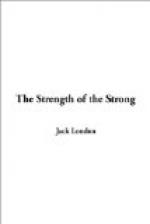Had the reader again been in Peking, six weeks later, he would have looked in vain for the eleven million inhabitants. Some few of them he would have found, a few hundred thousand, perhaps, their carcasses festering in the houses and in the deserted streets, and piled high on the abandoned death-waggons. But for the rest he would have had to seek along the highways and byways of the Empire. And not all would he have found fleeing from plague-stricken Peking, for behind them, by hundreds of thousands of unburied corpses by the wayside, he could have marked their flight. And as it was with Peking, so it was with all the cities, towns, and villages of the Empire. The plague smote them all. Nor was it one plague, nor two plagues; it was a score of plagues. Every virulent form of infectious death stalked through the land. Too late the Chinese government apprehended the meaning of the colossal preparations, the marshalling of the world-hosts, the flights of the tin airships, and the rain of the tubes of glass. The proclamations of the government were vain. They could not stop the eleven million plague-stricken wretches, fleeing from the one city of Peking to spread disease through all the land. The physicians and health officers died at their posts; and death, the all-conqueror, rode over the decrees of the Emperor and Li Tang Fwung. It rode over them as well, for Li Tang Fwung died in the second week, and the Emperor, hidden away in the Summer Palace, died in the fourth week.
Had there been one plague, China might have coped with it. But from a score of plagues no creature was immune. The man who escaped smallpox went down before scarlet fever. The man who was immune to yellow fever was carried away by cholera; and if he were immune to that, too, the Black Death, which was the bubonic plague, swept him away. For it was these bacteria, and germs, and microbes, and bacilli, cultured in the laboratories of the West, that had come down upon China in the rain of glass.
All organization vanished. The government crumbled away. Decrees and proclamations were useless when the men who made them and signed them one moment were dead the next. Nor could the maddened millions, spurred on to flight by death, pause to heed anything. They fled from the cities to infect the country, and wherever they fled they carried the plagues with them. The hot summer was on— Jacobus Laningdale had selected the time shrewdly—and the plague festered everywhere. Much is conjectured of what occurred, and much has been learned from the stories of the few survivors. The wretched creatures stormed across the Empire in many-millioned flight. The vast armies China had collected on her frontiers melted away. The farms were ravaged for food, and no more crops were planted, while the crops already in were left unattended and never came to harvest. The most remarkable thing, perhaps, was the flights. Many millions engaged in them, charging to the bounds of the Empire to be met and turned back by the gigantic armies of the West. The slaughter of the mad hosts on the boundaries was stupendous. Time and again the guarding line was drawn back twenty or thirty miles to escape the contagion of the multitudinous dead.




